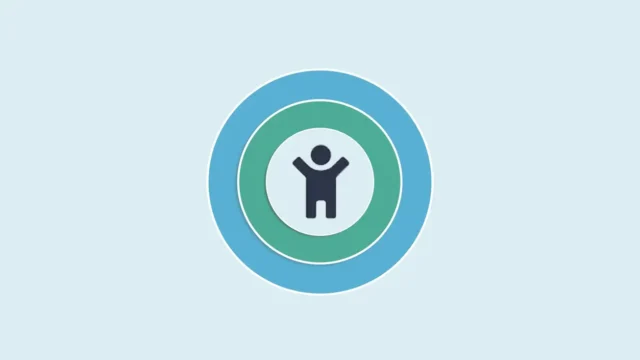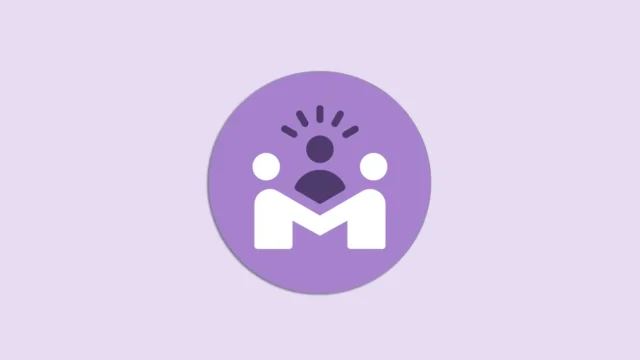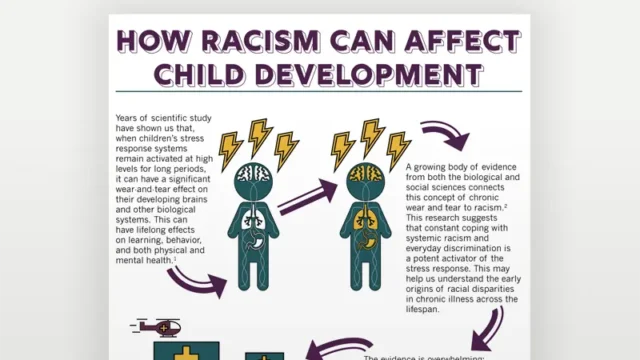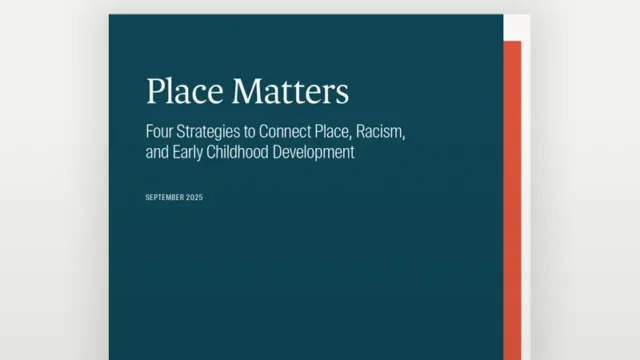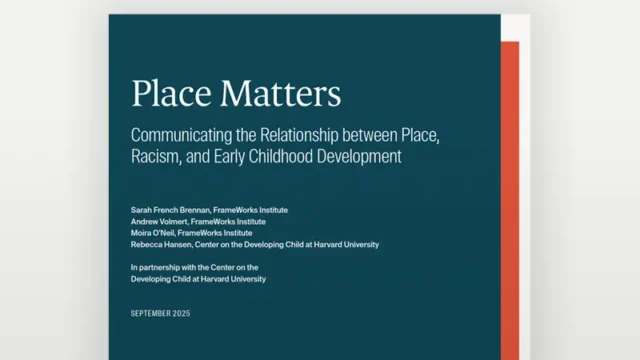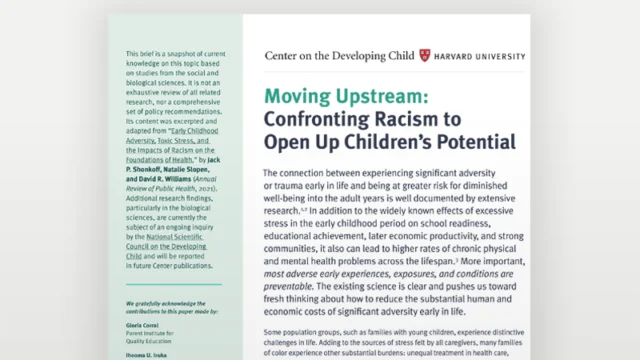Policy Q&A: How an Alabama Childcare Provider Is Advocating for More Equitable Policy Solutions
Camille Bennett, a childcare provider and advocate in Alabama, discusses the need for equitable policy solutions to support the health and well-being of young children and their caregivers.
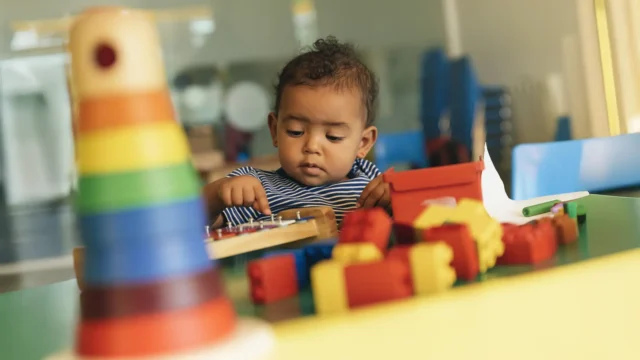
In our Policy Q&A series, we’re featuring a diverse array of perspectives on the many ways that science, community expertise, and lived experience can inform policy and program design to support healthy development during the earliest years.
As a childcare provider for close to two decades, Camille Bennett understands that the relationships young children have with caring adults are foundational to healthy development. She also sees firsthand how children’s development is shaped by a much wider range of influences in their environments. And how these conditions—including everything from health care during pregnancy to access to healthy food and reliable transportation—are not equally or fairly distributed across children’s developmental environments. They have been shaped by structural racism embedded in both historic and current policies.
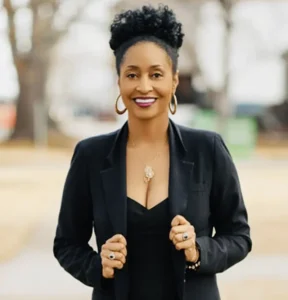
The broader impact of these systemic factors has led Bennett to expand her efforts to support children’s healthy development far beyond the walls of her two childcare centers in Florence, Alabama. Bennett is also the founder and executive director of Project Say Something, a nonprofit organization dedicated to confronting anti-Black systems and ideologies across a range of sectors using education, community empowerment, and advocacy. Among their many areas of work, Project Say Something is the only provider-led childcare policy advocacy organization in the state. It also provides direct support to families through causes like the Black Mothers’ Emergency Fund and access to doula services. Additionally, Bennett is a member of the Council on Addressing Racism in the Early Years (CARE)—a multidisciplinary partnership between the Center on the Developing Child at Harvard University, the Center on the Ecology of Early Development at Boston University, and the Equity Research Action Coalition at the University of North Carolina at Chapel Hill—that aims to analyze, synthesize, and communicate what current evidence tells us about the effects of racism on children’s everyday lives.
In this Q&A, Bennett shares how high-quality childcare supports healthy development, the importance of Black women’s representation in childcare advocacy, and how key policy changes can help increase stability, address systemic racism, and achieve more equitable outcomes for young children.
How do you see childcare centers supporting healthy development and making a difference in the lives of young children every day?
Childcare centers, particularly in marginalized communities, are often not just a childcare center but a community resource center as well. Quality childcare centers also provide wraparound services for the families. About 90% of our clients are single, working mothers, and we’re seeing a lot of children with special needs, especially post-COVID. So, we’re often the first to identify if a child has special needs and can provide resources for how to get to early intervention services—speech therapy, for example—and support families in need. At our centers, we really see not only the development of children, but the development of families.
In terms of other ways of supporting children: We understand that children need nutritious food, and our centers participate in the wonderful USDA food program. We also understand that children learn through play in the preschool age, and we make sure that their curriculum is developmentally appropriate.
Project Say Something works to address systemic racism across a wide range of sectors. Why was it important for you to include childcare advocacy?
“We understand the positive impact that childcare centers can have, and we knew that we had to advocate for the policies that childcare centers need.”
If families can’t get the quality care that they need for their children, the struggle continues. We understand the positive impact that childcare centers can have, and we knew that, by necessity, we as an organization had to advocate for the policies that childcare centers need.
Childcare centers are disproportionately owned by Black women in Alabama. And you have to go back to history and understand that Black women have been undervalued for caring for children for decades, particularly in a Deep South state where slavery and segregation were prevalent.
And that undervaluing is reflected in our state budget. The Alabama Education Trust Fund budget is $9.9 billion and supports K-12 schools and more, but it does not support childcare centers. There’s currently this huge funding gap for children between birth and four. Until then, our state government expects privately owned childcare centers to find our own way and care for children with special needs like autism or developmental delays—without financial support for staff or aides.
What first inspired your organization to get involved in childcare advocacy?
It was the COVID crisis. Most childcare centers that primarily serve children receiving government subsidies are Black owned and operated. For a few months during COVID, the Department of Human Resources continued to pay childcare centers regardless of the children’s attendance to keep us afloat. Eventually, however, we were forced to open because they stopped paying for children who were not attending. But Alabama legislators did not consider safety protocols, and they were asking us to pack our centers with children. It was indicative of the undervaluing of childcare centers and staff that serve marginalized parents. So, the first thing Project Say Something worked on was meeting with legislators to say this is not safe. And we were able to get those ratios down and into a position where we could properly socially distance. When we noticed that we were able to make a change, we knew there was a niche for Project Say Something to get involved.
Since then, we’ve seen that whenever there’s any policy change, there’s always going to be an impact on families and providers. For example, in order to receive the childcare subsidy, parents previously had to swipe a card in and out every day. If they forgot even one swipe, the center was not paid for the entire week, and we had no way to recover the funds. We had to come in and say, other states, like Mississippi and Tennessee, are doing it differently. And we had a strong enough argument where they changed it so that a parent now only has to swipe once every 10 days. And that took a huge burden off both providers and families.
What key childcare policy issues are you currently focused on?
The biggest issue we’re working on is getting the state’s Education Trust Fund to set aside $60 to $120 million for childcare. That would give us the ability to increase staff wages and, therefore, stability and quality in childcare centers. The Education Trust Fund offers funding for almost everything—except for childcare. The funding that is set aside is performance-based, which is quite challenging for many centers to access if they’re already navigating a staffing crisis.
During COVID, we received funding to pay our teachers higher wages. But that funding ended this year—with no solution for how to pay our teachers what they deserve. We made the decision early on that we were going to continue to put our staff first and pay those bonuses regardless of what the state decided. But it’s difficult for a lot of childcare providers because we’re always competing with industries that can pay more. And that affects staff turnover and stability in the classroom.
Tell us more about how decreasing staff turnover could help provide more stability for young children and families.
We’ve been fortunate that we’ve stabilized now, but there was a period where we did have turnover. And you see more behavioral issues with the children. You see parents not feel safe or stable in the childcare center because every time they get used to one teacher, they turn around and there’s a new one.
A key component of early child development is to have structure and stability. I can’t stress enough the impact that has on a child. And it doesn’t just benefit children—stability also lowers the stress levels of parents, teachers, and childcare providers.
“A key component of early child development is to have structure and stability. I can’t stress enough the impact that has on a child.”
There’s a huge need. If half of the children in a three-year-old classroom have special needs—which is what we’re seeing—the teachers become overwhelmed, and eventually they’re going to find other places to work.
Given the growing number of children with special needs—which can at times be overwhelming for childcare providers and contribute to turnover—Project Say Something is also pushing for more support in this area to ensure that children and caregivers alike have the resources that they need. For example, we’d like to see early intervention services become more accessible. The problem we’ve seen is that currently the family must create time in order to get services. So, if a child needs speech therapy, that parent has to take off work and come pick the baby up. Instead, we could have an early intervention specialist come in and, with a parent’s approval, provide services directly at the center. That would increase access.
When it comes to advocating for policies like these, why is it so important to have childcare providers—particularly Black women providers—at the table?
Childcare centers are disproportionately Black owned and operated. But we saw that the childcare advocates were predominantly White women or working for a White-founded nonprofit.
If you are an advocate for children, it’s important that you understand childcare providers, that you understand the communities that we serve, and that you understand every facet of childcare. And what we were finding is that a lot of the nonprofits were not interested in the culture of childcare centers. For example, if they were using case studies, it would typically be a Head Start. And Head Start, as a federally funded program, is not the same as privately-owned childcare facilities.
So, there’s this huge gap in understanding the culture of childcare, particularly for marginalized communities. There’s also this idea that childcare providers don’t have the education to advocate for themselves—which is not true. Most childcare providers know policy much more than anyone in terms of how it impacts them.
And, because the advocates in this space lacked that cultural understanding, the resulting policies often did not reflect the needs of the providers. So, as an organization, we knew we had to fill this gap.
As a childcare provider, you build relationships with families and witness many of their successes and struggles firsthand. From your experience, what are the biggest issues facing young children and families in your community?
It’s the need for cash assistance when emergencies arrive. Families are struggling to meet their basic needs, to keep their lights on, to meet the price of food—food stamps haven’t adjusted to the rising cost of food. So, our organization steps in and provides mutual aid to help. Even needs as simple as diapers and wipes—at the centers, we either have to get donations for free diapers or buy them ourselves because a lot of times our families cannot afford them.
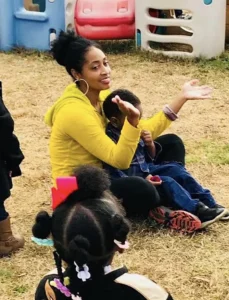
Transportation, too. If the car goes down, the family goes down—because mom can’t get to work, and if mom loses her job, she can’t receive the childcare subsidy anymore, and she loses her childcare. She has to start from the beginning. All that comes from losing transportation.
And that stress trickles down. Our staff builds connections with families—we’re there with them before and after work every day. But that also means we’re the first to see the stress, and we have to navigate that. And if mom’s stressed, then the child is stressed, too. And the cycle continues.
In terms of handling those stressors, this year we’re hoping to get funding for counseling services. The situation has gotten so tough that we need it—not only for the families, but for the childcare staff as well.
The earliest years—including during pregnancy—build the foundation for children’s development. How does Project Say Something help support families and young children during this time period as well?
Alabama has the highest maternal death rate in the country. Beyond understanding those statistics, we see the expectant mothers who are stressed, who don’t seem to have any support, who don’t have a choice in what doctor Medicaid gives them. So, we realized we also needed to create a space for Black doulas in our community by both providing scholarships for the training of Black doulas and funding their services.
Most of the mothers that we serve exist within our childcare centers. And we’re seeing more confidence in mothers who have that doula support. They feel safer and like their needs are being met. And then the child can go into a childcare space where they feel safe and supported as well.
As a member of the Council on Addressing Racism in the Early Years, what do you hope to contribute with your voice as both an advocate and a childcare provider?
One reason this work is so valuable is because we’re hearing perspectives from across the nation—and not just from professors who are doing research, but from childcare providers and grassroot organizers. For my part, I’m able to contribute the intricacies of what it’s like on the day to day to provide childcare. And I hope this will help people doing the research understand that there are so many children from birth to five that are in these childcare centers, understand what that looks like, and understand what those children and families really need.
The Center on the Developing Child is committed to elevating a variety of perspectives around supporting healthy development in the earliest years. The views and opinions expressed by Policy Q&A subjects are those of the individual and do not necessarily represent those of the Center.
